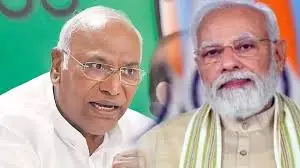Kharge slams PM Modi for skipping all-party meet on Pahalgam, says: ‘Country supreme, then come parties, religion’

Kharge Criticizes PM Modi’s Absence at All-Party Meet on Pahalgam
PM Modi Skips Crucial Meeting
Congress President Mallikarjun Kharge has sharply criticized Prime Minister Narendra Modi for not attending the all-party meeting on Pahalgam. The meeting was called to address important issues concerning the region. Kharge called out the PM’s absence, saying it was inappropriate, especially during a time when the nation’s interests should be prioritized over politics.
Nation First, Then Parties and Religion
In his address to the media, Kharge emphasized that the nation must come before all else. “The country is supreme; only after that come political parties and religion,” he asserted. His comments highlight concerns that politics and religion are being given undue importance, overshadowing national unity and governance.
Pahalgam: A Critical Issue for National Unity
Pahalgam, a major tourist destination in Jammu and Kashmir, has become a point of political contention. The region is not only vital for tourism but also plays a key role in religious and environmental matters. The all-party meeting aimed to address various concerns surrounding its governance. Without the PM’s participation, opposition leaders argue that a vital opportunity for dialogue and cooperation was lost.
Opposition Voices Rising Against Unilateral Decisions
Kharge’s remarks are part of a broader criticism from the opposition. Many have accused the Modi government of avoiding collaborative discussions. They argue that important regional issues, especially in sensitive areas like Jammu and Kashmir, require input from all political parties. Without open dialogue, the government risks alienating local stakeholders and creating further divisions.
Impact on Future Elections
Kharge’s criticism is likely to have implications for upcoming elections. The opposition, particularly the Congress, seems to be positioning itself as a more inclusive alternative. With growing concerns about governance in Jammu and Kashmir, this issue could play a significant role in the political discourse in the months ahead.






